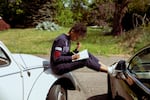
Esperanza Spalding
Courtesy of Holly Andres
Esperanza Spalding contains multitudes. She’s a world-renowned jazz bassist, a four-time Grammy Award-winning composer and most recently, a Harvard University professor.
And now, Spalding wants to build a sanctuary for artists on nearly an acre of land in Portland’s St. Johns neighborhood. A space specifically for artists who identify as Black, Indigenous or People of Color.
The idea of curating a retreat for artists of color began forming while Spalding was at a retreat herself, writing music for her 2018 album “12 Little Spells.”
“[It] was the first time I realized how important [artist retreats] were,” she says.
But it wasn’t until the pandemic hit that Spalding finalized the vision for the sanctuary. She had moved back home to Portland to ride out the storm with friends and family. But the seemingly endless quarantine began straining those relationships.
“I just wanted a break from my big brother who I love to pieces,” says Spalding. “I was staying with him when I moved back to Portland and somebody was about to lose a limb.”
So she found herself an Airbnb at an organic farm in Wasco, Oregon, for some much needed alone time.
“Before the night was over, I learned that the couple that owned that place had originally bought it because they had a vision of making artists’ retreats and healing retreats out in the country,” Spalding recalls. “So I told them about my vision and what I was trying to do. And then one thing led to another and they were like, ‘why don’t you host one here?’ It was pretty magical.”
Spalding named the impromptu Wasco artist retreat: The Songwrights Apothecary Lab. She brought 10 artists together, some in person, some via Zoom.
“It was really enlightening how powerful and renewing it is for artists of color to just be with each other without an agenda,” Spalding says, “So that kind of confirmed and helped me distill this idea that I’ve had for a long time of curating some sort of sanctuary space.”
Spalding says the intention with this sanctuary space is to support the creation of restorative art in a restorative environment.
She hopes to plant a large organic garden surrounded by freestanding artist studios, a reading room for hosting poetry events, and maybe even a tea room.
Spalding says, “I think of it as a space that other artists of color can come into and stay for up to a week or just come for the afternoon, know that the garden is there and they just come sit and work on something or have a call or take a break from their day, whatever.”
And if all goes according to plan, the sanctuary will also become a home base for Spalding when she’s in town to create and record new music.
Despite her academic and artistic accomplishments so far, Spalding says the process of buying land has been challenging.
“It doesn’t matter that I teach at Harvard, it doesn’t matter that I have a name. It doesn’t matter that I have half the down payment in my piggy bank, it doesn’t matter that I’ve paid all my bills on time. I learned that I’m not immune from all the same issues that people without inherited wealth or credit run into when you want to buy your house.”
Spalding continues, “So it was humbling and heartening to witness what most people have to go through with much less support than I had. And I’m just, it was highlighting the inequity in home ownership that I never had to confront.”
Spalding has until Thursday, June 3, to come up with the full $300,000 needed to buy the St. Johns plot. She’s set up a GoFundMe page that has raised roughly a third of her goal amount. But even with this looming deadline, Spalding remains hopeful, upbeat and grateful.
“If the money doesn’t come through and I can’t get this property,” says Spalding, “I’m going to look for the next one. This is a practice I’m committed to.”
